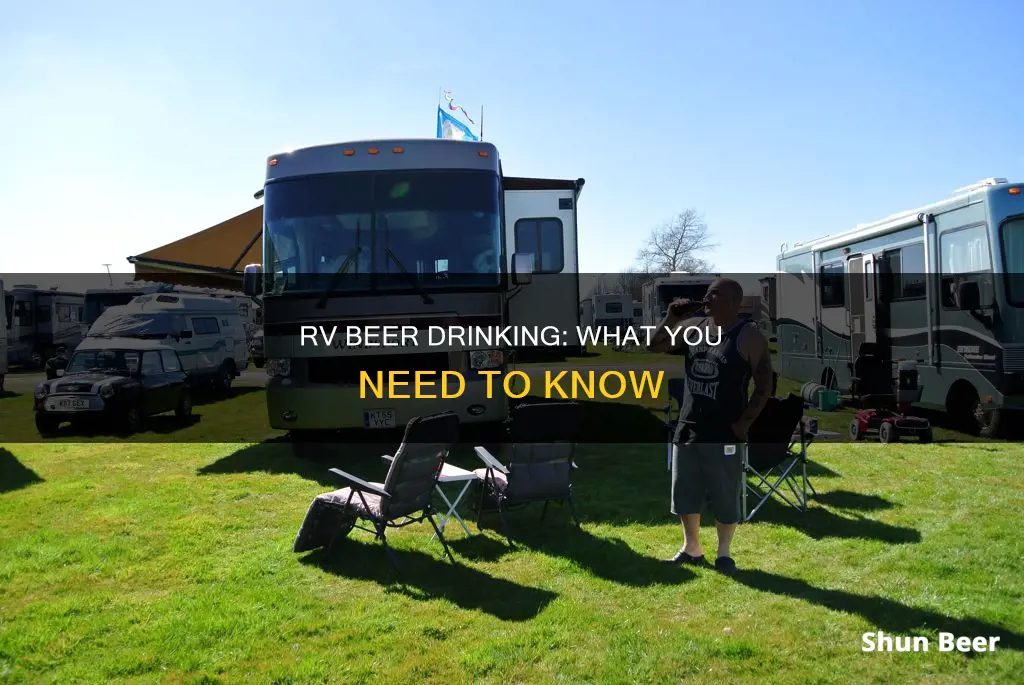
Drinking alcohol in a moving RV is a complicated issue, as the rules vary depending on location. In the US, open container laws apply to motorhomes when they're being used as vehicles, but there are exceptions. In some states, the length of the RV matters, with vehicles over 21 feet long sometimes being exempt from open container laws. In other states, like California, passengers are allowed to drink alcohol in a moving RV, but not the driver. In Wisconsin, no open containers are allowed in any RV. In Canada, you're only allowed to bring a limited amount of alcohol with you in your RV when crossing the border. To avoid trouble, it's best to check the local laws before drinking in an RV.
| Characteristics | Values |
|---|---|
| Can you drink beer in an RV? | In most states, open container laws apply to all moving RVs regardless of their size, except for one exception: if the RV is over 21 feet in length. |
| Can passengers drink beer in an RV? | In some states, passengers are allowed to drink beer in an RV if it is over 21 feet in length. However, it is not recommended as it may be illegal in some states and can lead to fines or arrest. |
| Can the driver drink beer in an RV? | No, the driver should never drink alcohol in an RV. |
| Can you drink beer in a parked RV? | Yes, when an RV is parked, it is considered a domicile, and open container laws do not apply. However, on private campgrounds, it depends on the rules set by the campground owners. |
| Can you drink beer in an RV in dry regions? | No, dry regions have strict laws that ban all forms of alcohol, including transportation through their boundaries. |
| Can you drink beer in an RV in Canada? | Rules may vary, so it is recommended to check with the Canadian Border Service Agency (CBSA) for the latest information. |
What You'll Learn

Open container laws in the US
Open container laws prohibit the possession of open containers of alcohol within a vehicle. Typically, these laws apply to areas of the car that are readily accessible to vehicle occupants. So, open containers in the trunk or the rear of an SUV that doesn't have a separate trunk are usually allowed.
In some states, the laws are more broadly defined, prohibiting any open containers in the area of the car where the driver and passengers are located. In other states, only the driver is prohibited from possessing an open container.
The majority of US states and localities prohibit possessing or consuming an open container of alcohol in public places, such as on the street. However, 24 states do not have statutes regarding the public consumption of alcohol, and the definition of "public place" is not always clear. For example, California only prohibits possessing open alcoholic beverage containers in public places owned by a city, county, or city and county, or any recreation and park district, regional park, or open-space district.
Penalties for open container violations vary from state to state but can include fines, possible jail time, license demerit points, and community service.
When it comes to RVs (recreational vehicles), the rules can be confusing because an RV is considered both temporary housing and a vehicle. Open container laws apply to RVs in the same way they do to regular automobiles. So, any open container inside a moving RV or an RV that is not parked at a campsite is considered illegal. This means that drivers and passengers can be cited by police for open containers, even if they haven't consumed any alcohol. It is recommended that you do not carry alcohol in an RV until you are parked at your campsite to avoid unnecessary police attention.
Additionally, privately owned campgrounds can make their own rules regarding alcohol, so it is essential to check the alcohol policy of your RV park. Public campgrounds also have varying rules regarding alcohol, so it is important to familiarise yourself with their regulations.
Beer and Sex: A Match Made in Heaven?
You may want to see also

Drinking in a stationary RV
First, it's important to note that RVs are considered vehicles, and as such, open container laws apply to them in the same way they do to any other vehicle. This means that it is illegal to have an open container of alcohol in the driver's seat or any other area of the motorhome where the driver can reach it. In fact, in all states, the driver cannot have open alcohol in an RV motorhome. However, some states allow passengers to drink if they are in the living quarters of the RV and not sitting near the driver. So, even when the RV is stationary, it's important to keep the alcohol away from the driver's seat and out of reach of the driver.
When it comes to drinking in a stationary RV, the location of the RV is also important. If the RV is parked on public property, such as a street or a parking lot, drinking may not be allowed. Open container laws may still apply in these areas, and you could be cited by police for having an open container. Additionally, if you are camping in a dry county, consuming alcohol is illegal, even if the RV is stationary. Dry counties are areas that do not allow alcohol at all, and you can be fined for breaking their dry laws.
If the RV is parked at a campsite, drinking is generally allowed, as long as you are of legal drinking age and the campsite allows alcohol. Privately owned campgrounds can make their own rules when it comes to alcohol, so it's important to check the alcohol policy before assuming you can drink. Public campgrounds also have their own rules, and some may only allow alcohol of a certain alcohol-by-volume or forbid it altogether.
Overall, when it comes to drinking in a stationary RV, it's important to be aware of the local laws and regulations, as well as the rules of the campsite or parking area. It's always better to be safe than sorry and avoid any potential legal trouble.
BeerSmith Compatibility: Apple Devices and Beyond
You may want to see also

Drinking in an RV in Canada
Drinking in a Moving RV in Canada
It is important to note that drinking alcohol in a moving RV is generally prohibited in Canada. The laws regarding open containers of alcohol apply to RVs, as they are considered vehicles. These laws vary across provinces, so it is essential to check the specific regulations in the province you are visiting or travelling through. However, as a general rule, it is advisable to refrain from drinking alcohol while in a moving RV to comply with open container laws and avoid any legal consequences.
Drinking in a Parked RV in Canada
When it comes to drinking in a parked RV, the rules can vary depending on the location and local regulations. Here are some important considerations:
- Campgrounds: Privately owned campgrounds have the autonomy to set their own rules regarding alcohol consumption. Always check the alcohol policy of the campground before your visit. If they prohibit alcohol, you must abide by their rules, regardless of local or provincial laws.
- Public Campgrounds: These campgrounds usually have their own rules regarding alcohol consumption. Some may allow specific types of alcohol, while others may have restrictions on alcohol content (alcohol-by-volume). It is crucial to respect and follow the rules of the public campground you are visiting.
- Public Spaces: When sitting around a campfire in a public campground, remember that you are in a public space. Enjoy your alcohol responsibly and avoid overindulging, as it may lead to disturbances or violations of public intoxication laws.
- Dry Regions: Some regions in Canada, such as counties or townships, are considered "dry," meaning they have strict laws prohibiting all forms of alcohol within their boundaries. Transporting alcohol through these regions can result in fines, so it is essential to be aware of the local regulations to avoid any legal issues.
- Age Restriction: It is important to ensure that everyone consuming alcohol in the RV is of legal drinking age, which is 18 years or older in Canada.
- Driver's Responsibility: While drinking in a parked RV is generally allowed, it is crucial that the driver remains sober and refrains from consuming alcohol. Drinking and driving is illegal and can lead to severe consequences, including fines, licence suspension, or even jail time.
Crossing the Border with Alcohol
When travelling to Canada in an RV, it is important to be aware of the regulations regarding bringing alcohol across the border. According to current regulations, you are allowed to bring a limited quantity of alcohol into Canada:
- 2 bottles of wine (750 ml each)
- 1.14 litres of liquor
- 24 cans or bottles of beer (355 ml each) per adult
Remember to check for any updates or changes to these regulations before your trip, as rules may evolve.
In conclusion, while drinking in an RV in Canada is possible, it is important to be mindful of the laws and regulations that apply. Always put safety first, and remember that drinking and driving is illegal and can lead to severe consequences. Enjoy your beverages responsibly, and make sure to follow the guidelines set by the local authorities and campground management.
Beer and Abs: Is It Possible to Have Both?
You may want to see also

Drinking in an RV in California
In general, drinking alcohol in a moving vehicle is illegal in California and most other states. Open container laws prohibit the consumption of alcoholic beverages by those in moving vehicles, regardless of who is driving. These laws apply to RVs when they are being used as motor vehicles. However, there are a few states that allow passengers to drink in a moving RV, including Alaska, Connecticut, and Delaware.
When it comes to RVs, the size of the vehicle may also be a factor in drinking laws. In Florida and Louisiana, passengers are allowed to consume alcohol in the back living area of an RV while it is in motion, but only if the RV is over 21 feet in length. In California, drivers are exempt from prosecution under open container laws if they have an open container in the back of the RV. However, it is important to note that drinking and driving is illegal, and all occupants of the RV must be of legal drinking age.
It is always a good idea to check the local laws and regulations before consuming any alcoholic beverages in an RV, as they can vary from state to state and even county to county. Additionally, if you are staying at a campground, their regulations may supersede state laws, as they are privately owned properties. So, it is important to read the campground rules before consuming any alcohol.
In summary, while there may be some exceptions, it is generally advisable to refrain from drinking alcohol in an RV in California, especially if the vehicle is in motion. It is important to know and comply with the local laws to avoid any legal issues or fines. The safest option is to wait until you are parked for the night and consuming alcohol responsibly.
Underage Beer Drinking: Exploring the Legal Drinking Age Limits
You may want to see also

Drinking in an RV in Michigan or Ohio
However, there is an exception to the open container laws in both states for vehicles that are over 21 feet in length. So, if your RV falls into this category, you may be allowed to drink while it is in motion. That said, it's important to check the specific laws of each state, as they can vary. For example, in Ohio, the only vehicle in which passengers are allowed to drink alcohol is a chauffeured limousine, which does not include RVs.
When it comes to drinking in an RV that is parked, the rules are different. In Michigan and Ohio, it is generally legal to drink in an RV when it is stationary and on private property or at a private campground. In this scenario, the RV is considered a domicile, and open container laws do not apply. However, it's important to note that if you are camping on public land, there may be additional restrictions, and a ranger or police officer may search your RV for any violations of alcohol laws.
In conclusion, when it comes to drinking in an RV in Michigan or Ohio, the key things to remember are: refrain from drinking and driving, be mindful of open container laws, and check the specific laws of each state, especially when crossing state lines. If you're parked on private property or at a private campground, you're likely in the clear, but always be respectful of your surroundings and drink responsibly.
Beer and Gout: What You Need to Know
You may want to see also
Frequently asked questions
It depends on where you are. In the US, open container laws apply to RVs when they are being used as motor vehicles. In some states, passengers are allowed to drink beer in an RV if it is over 21 feet in length. However, in other states, such as Wisconsin, no open containers are allowed in any RV. In Canada, you are only allowed to bring a limited amount of alcohol with you in your RV when crossing the border.
No, open container laws apply to all moving RVs in the US, regardless of their size, except for one exception: if the RV is over 21 feet in length. However, it is still advisable that passengers refrain from drinking when the vehicle is in motion.
Yes, in the US, open container laws do not apply when the RV is parked and being used as a domicile. However, privately owned campgrounds can make their own rules when it comes to alcohol, so it is always best to check the alcohol policy before arriving.







